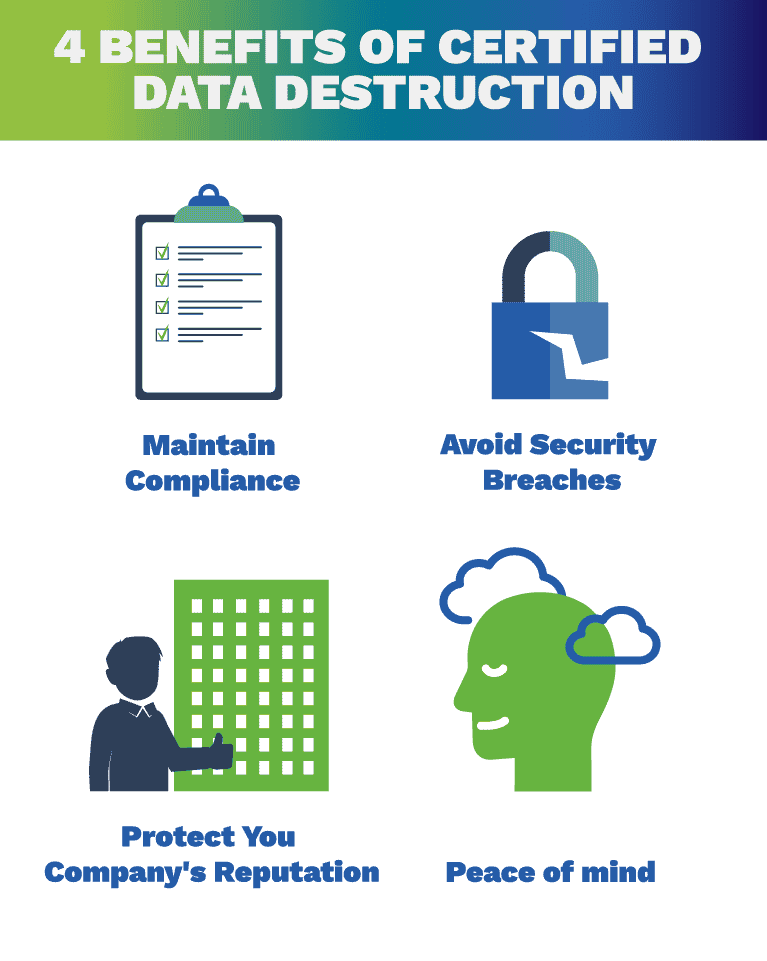Data Destruction Solutions: A Key Element in Your Cyber Security Technique
Data Destruction Solutions: A Key Element in Your Cyber Security Technique
Blog Article
The Crucial Nature of Data Destruction in Upholding Computer System Safety Services and Protecting Versus Unauthorized Accessibility
In an era where information breaches and identity burglary are increasingly widespread, the importance of efficient information damage can not be overstated. Numerous methods, from data cleaning to physical destruction, serve as important safeguards against unapproved access.
Significance of Information Damage
In a significantly digital world, the importance of information devastation can not be overstated. As organizations amass large quantities of sensitive details, the potential repercussions of falling short to properly dispose and manage of that data become significantly extreme. Data breaches, identity theft, and business reconnaissance posture significant risks, emphasizing the necessity of efficient data damage techniques.

Additionally, as technology progresses, so as well do the techniques through which malicious actors look for to make use of delicate information. Organizations should continue to be cautious and positive in their information damage approaches to protect against these evolving dangers. By focusing on information damage, companies not only secure their possessions yet also foster trust among stakeholders and customers, demonstrating a commitment to liable data monitoring and safety and security techniques.
Approaches of Effective Information Damage
To make sure the irreversible and full devastation of delicate information, organizations can employ a range of reliable approaches tailored to their specific requirements. One of one of the most common approaches is information cleaning, which entails utilizing specialized software program to overwrite existing information numerous times, making healing basically difficult. This is specifically beneficial for hard disks and solid-state drives, where typical removal methods are inadequate.
An additional reliable strategy is degaussing, which utilizes strong magnetic fields to interrupt the magnetic domain names on storage space media, rendering the information irretrievable. This method is specifically matched for magnetic storage devices, such as disk drive and hard disks.
Physical devastation is additionally a sensible alternative, involving the shredding, crushing, or incineration of storage gadgets. This approach warranties that information can not be recovered, making it suitable for companies managing extremely sensitive info.

Conformity With Data Protection Rules
Organizations have to not just concentrate on effective data destruction techniques but also guarantee compliance with data protection policies that regulate exactly how delicate details is managed and dealt with. Sticking to these regulations is vital for preserving and safeguarding individual data consumer depend on. Laws such as the General Information Protection Policy (GDPR) in the European Union and the Wellness Insurance Policy Transportability and Liability Act (HIPAA) in the United States impose strict guidelines on data management, that include demands for the protected disposal of sensitive information.
To attain conformity, companies need to execute thorough data destruction plans that align get redirected here with these legal structures. This consists of identifying information that calls for destruction, developing methods for safe methodsâEUR" such as shredding physical media or utilizing software program that satisfies industry requirements for information wipingâEUR" and preserving comprehensive records of damage tasks. Routine audits needs to be performed to guarantee adherence to these policies and to recognize any possible areas for renovation.
Failing to adhere to information defense laws can result in substantial lawful ramifications, including significant penalties and damages to a company's online reputation. As a result, incorporating compliance right into data destruction techniques is not just a legal commitment yet likewise an important element of a durable details safety approach.
Effects of Poor Data Handling
Poor information handling can lead to extreme consequences that expand past prompt operational troubles. Organizations may encounter substantial financial losses because of information breaches, which typically cause costly remediation efforts, lawful costs, and regulatory fines. These economic effects can strain resources and impede development, ultimately influencing an organization's lower line.
Additionally, poor data handling can seriously harm a company's track record. Clients, stakeholders, and partners may lose count on an entity that falls short to protect sensitive information, leading to reduced client commitment and prospective loss of service chances. This disintegration of depend on can take years to restore, if it can be recovered in any way.
In addition, organizations can encounter legal ramifications occurring from non-compliance with data protection laws. Such violations may result in fines and investigations, worsening the financial worry and additional staining the company's image.
In the realm of cybersecurity, insufficient information monitoring practices can develop susceptabilities that make systems more information much more vulnerable to unauthorized gain access to and cyberattacks. Ultimately, these consequences underscore the vital value of executing robust information managing procedures to guard sensitive information and keep organizational stability.
Best Practices for Secure Data Disposal


Firstly, data ought to be classified according to its level of sensitivity. Sensitive information calls for much more extensive disposal techniques, such as shredding physical papers and making use of advanced software application for electronic data wiping. Utilizing licensed data devastation solutions guarantees compliance with sector policies and requirements.
Second of all, companies need to carry out an information disposal plan that mandates routine audits. This policy needs to describe the procedures for information retention and destruction, making sure that obsolete data is taken care of without delay and securely. Educating employees on these protocols is important to promoting a culture of security awareness.
Lastly, maintaining comprehensive records of disposed information improves responsibility and offers a clear audit trail. This documents needs to include the kind of information damaged, the approach made use of, and the date of disposal.
Conclusion
Embracing durable methods such as information wiping, degaussing, and physical devastation, alongside compliance with policies like GDPR and HIPAA, is crucial for safeguarding sensitive info. Overlooking proper information disposal methods can lead to severe repercussions, consisting of data violations and legal consequences.
In a period where data violations and identity burglary are increasingly common, the significance of reliable information damage can not be overemphasized. data destruction. Data violations, identity burglary, and corporate espionage position substantial hazards, underscoring the necessity of effective information damage practices
Compliance with policies such as GDPR and HIPAA requireds that organizations apply rigorous data defense measures, including the safe and secure destruction of data at the end of its lifecycle.
By prioritizing data redirected here damage, firms not just protect their properties but likewise foster trust amongst stakeholders and clients, showing a commitment to responsible data management and security practices.
Organizations should not only focus on efficient data damage methods however likewise guarantee conformity with information protection laws that govern how delicate info is taken care of and disposed of.
Report this page